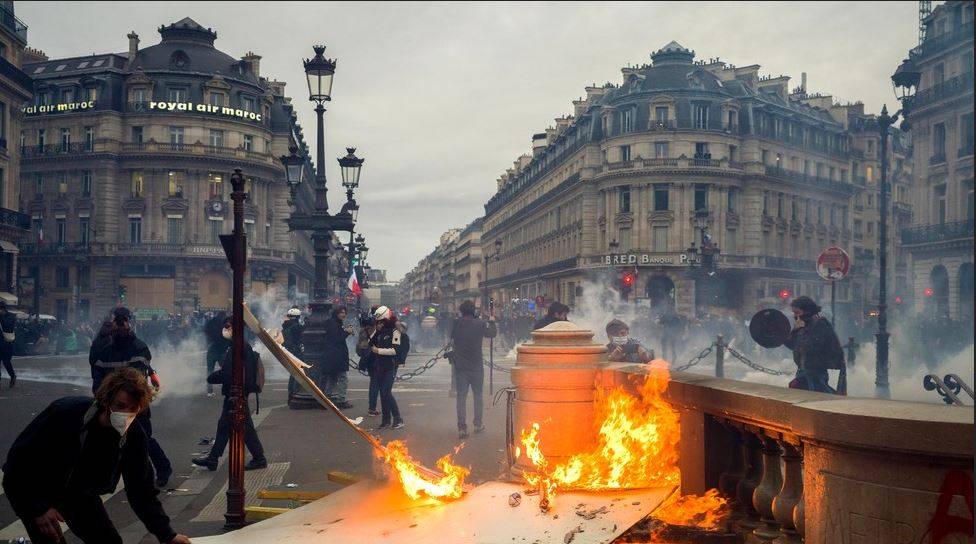1459 Views
The Frexit Specter: How Street Protests in France Are Turning an EU Nightmare into a Real Possibility
France has always been a land of protest. Strikes, gatherings, and people taking to the streets are part of its political and social fabric. However, what draws attention today is the new nature of these protests. This time, it is not merely a temporary protest or a reaction to a specific law; rather, it is a sign of a deeper crisis that could be costly for both President Emmanuel Macron's government and the stability of the European Union.
In recent weeks, cities like Paris, Marseille, and Lyon have witnessed widespread demonstrations. People are angry about the deteriorating economic situation, rising energy and fuel costs, and their declining purchasing power. This dissatisfaction is no longer limited to a single occupational group or specific class; it has encompassed a broad spectrum of society, from transport workers and nurses to teachers and middle-class families.
The root of this crisis is, of course, economic. Inflation in France has reached its highest level in decades, and energy costs have increased by over 20%. Meanwhile, the Macron administration has placed plans to reduce public spending and reform the pension system on its agenda to control the budget deficit. Many citizens view these reforms as unfair, arguing that the main burden falls on the middle and lower classes, while the wealthy and upper echelons of society remain shielded from these pressures. This sense of discrimination has strengthened the public's demand for justice and drawn them to the streets.
Labor unions have also seen this climate of discontent as an opportunity to increase pressure on the government. Coordinated strikes in sensitive sectors such as railways, hospitals, and education have affected the daily lives of millions. Beyond disrupting public services, these strikes indicate that the grievances are no longer situational but have become structural. The protesters' slogans no longer just demand the repeal of a specific law; they call for the government's resignation and an end to "austerity policies."
However, what distinguishes this round of protests from past ones is its ideological orientation. Among the slogans, demands for "leaving the European Union" and returning to "national identity" are being widely heard for the first time. This shift indicates that the current crisis is more than an economic one; it is an identity and political crisis. If this trend continues, there is a possibility of far-right nationalist currents winning in future elections—an event that could turn "Frexit" from a distant idea into a real possibility. Such a development would be a political earthquake not only for France but for the entire structure of the European Union.
This climate of crisis has directly impacted Macron's standing. Recent polls show his popularity has dropped below 30%, the lowest since his re-election in 2022. Opposition parties, from both the left and the right, are using this opportunity to weaken the government. Marine Le Pen, leader of the far-right "National Rally," has called Macron's government a "tool of Brussels" and promised to free France from EU domination if victorious. This perspective, besides its domestic appeal, might be welcomed by international actors like China, which would prefer to engage with a more independent France.
Meanwhile, the radical left wing also focuses on social justice, labeling the government's policies "anti-people." However, the notable point is that none of these factions have presented a comprehensive plan to solve the economic crisis; instead, they are primarily engaged in media narrative-building and deepening public distrust in the government.
The Macron administration has not remained idle either. In an attempt to calm the situation, it has suspended some reforms and promised to take the people's voices seriously. But many experts believe these symbolic measures are insufficient and that the government must adopt a more scientific and less ideological approach to its domestic policies.
European media are also following these developments with concern. German and Spanish newspapers have warned that French discontent could spread to other member states. Brussels is also worried; if the Union's second-largest economy cannot manage this crisis, the credibility of the entire European integration project will be called into question.
Ultimately, today's protests in France are not just a reflection of Macron's domestic policies. This crisis is the convergence of three major challenges:
1. An economic crisis stemming from the war in Ukraine, sanctions, and costly green energy policies;
2. A social crisis resulting from widening class divisions and unfair fiscal policies;
3. A political crisis arising from declining public trust in democratic institutions.
These developments are part of a broader crisis in the Western welfare model. A model that is now eroding under geopolitical pressures, global competition, and the rise of populism. France, like many Western countries, stands on the threshold of redefining its identity, values, and political future. Today's protests may be just the beginning of a larger question: Will Europe today be the Europe of tomorrow? The answer to this question will be determined not only in the streets of Paris but in the fate of the entire Western world.
Translated by Ashraf Hemmati from the original Persian article written by Amin Mahdavi

Comment
Post a comment for this article